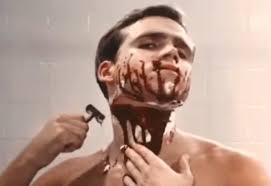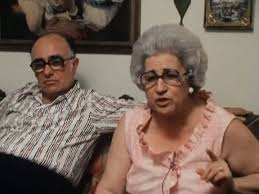STUDIO: Criterion | DIRECTOR: Martin Scorsese | CAST: Steven Prince, George Memmoli, Catherine Scorsese, Charles Scorsese, Martin Scorsese, Peter Bernuth
RELEASE DATE: 5/26/20 | PRICE: DVD $22.99, Blu-ray $27.99
BONUSES: 1970 radio interview with Scorsese; new conversation between director Martin Scorsese and film critic Farran Smith Nehme; new discussion among filmmakers Ari Aster and Josh and Benny Safdie
SPECS: NR | 135 mins | Drama/comedy | 1:33 | mono
“See this tie? Twenty dollars. See these shoes? Fifty dollars. See this suit? 200 dollars. See this car? 5,000 dollars. Wanna ride? C’mon…”
Thus begins the narrator/protagonist of Martin Scorsese’s second student film, “It’s Not Just You, Murray!” (1964), one of five shorts included in the fine Scorsese Shorts package.
The guy with the 20-dollar shoes ends up being betrayed by his best friend (foreshadowing the plot of Mean Streets) and ends his unresolved tale in a circle of carefree dancing individuals (an obvious nod to 8 ½). In the process, as in the other student film included here, we get a vivid, playful exploration of the themes that Scorsese would revisit in depth later on, while also seeing the incredible debt his style owes to the French New Wave.
The package includes another early short, “The Big Shave” (1967), as well as his well-loved later short docs, Italianamerican and American Boy: a Profile of Steven Prince. (Those hoping for a release of his early documentary feature Street Scenes will have to keep hoping.)
The films contained here definitely do point to Scorsese’s later triumphs (and some of the more recent rehashes). The most impressive aspect of the younger Scorsese was his encyclopedic knowledge of American and European cinema, and also his enthusiasm for the possibilities of film as a medium.
His first student film, “What a Nice Girl Like You Doing in a Place Like This?” (1963), plays like a classic work of American light comedy from the Sixties, directed by a younger “film school director.” (One thinks instantly of Coppola’s You’re a Big Boy Now.) Scorsese mixes media when telling his story of an urban schlemiel, using live-action, animation, eccentric editing and montages of photos conveying motion, in the manner of Chris Marker’s trend-setting 1962 short “La Jetee.”
After “Murray,” the next film chronologically (although the films are presented on this disc in reverse-chronological order) is “The Big Shave.” A simple, brutal work, the film depicts a man shaving until blood covers his face and neck. It is one of Scorsese’s two openly political works – the contemporary documentary Street Scenes (1970) is the other. The short still has the potential to shock and, because American culture hasn’t gotten any less violent, it still makes quite a statement about Americans’ mundane reaction to brutality.
The longer docs included in this package are both from Scorsese’s “golden era,” the Seventies, and as such are imminently rewatchable. Italianmerican (1974) is a very charming movie that has a lot of say about the immigrant experience and NYC tenement living, and also the behavior patterns of long-married couples. Scorsese seems to have left in every time one of his parents chides the other – his mother Catherine scolds her husband for not sitting close enough to her; he, in turn, notes that, when she’s telling stories, she isn’t talking like she normally does.
In this way the film is a great companion to his Italian-American movies, Mean Streets, Raging Bull, and Goodfellas, and is an incredibly authentic piece of filmmaking. One sees this in the script treatment by Scorsese and Mardik Martin, included in the package’s booklet, which was written to secure financing and carefully outlines the “characters” of the parents. The film clearly came about because Scorsese wanted to pay tribute to his parents but also felt that he had to stay true to their real personalities – or he would’ve heard from them the next time he came over for dinner.
In American Boy (1978) Scorsese reinforces onscreen that, while his colorful friend Steven Prince (best known as Andy the gun salesman in Taxi Driver) is telling the stories, he is directing the proceedings. Thus, Scorsese prompts Prince to tell a number of anecdotes but also instructs him on-camera, most notably at the end when he has Prince tell his most disturbing story three times in a row, asking for something different in his telling.
Scorsese is in his “Marty DiBergi” guise here. (Rob Reiner named his character in This Is Spinal Tap after the hyper Scorsese in The Last Waltz.) One can tell from the first sequence that something unusual is going on – perhaps the kind of unusual produced by a certain white powder? – when Prince and Scorsese are seen lounging in a hot tub together and then Prince makes a formal entrance in comic actor George Memmoli’s house, where he is tackled to the ground by Memmoli and the two proceed to wrestle around for a few minutes.
Later on, Scorsese is so acutely aware of the camera’s framing during the storytelling that he gestures on-camera to tell the cameraman to move back to Prince as he finishes a sentence that Memmoli started. This odd movement from raucousness to precision is mirrored by the stories, which go from lighter family tales to ones involving Prince’s heroin addiction and then his witnessing various deaths (one of which he caused).
Two of the stories had a life beyond this documentary. One about Prince killing a drug-fueled madman who attacked him while he worked at a gas station is told again by Prince in Richard Linklater’s 2001 animated feature Waking Life. Another one, about him rescuing an overdosing woman by injecting adrenaline into her heart using a medical dictionary and a magic marker was “borrowed” in its entirety by Quentin Tarantino for his Pulp Fiction screenplay.
The supplements in the package contextualize the short films, although one, a conversation between filmmakers Ari Aster (Midsommar) and Josh and Benny Safdie (Uncut Gems), is a somewhat precious attempt to recreate the spirit of Scorsese’s docs by having them acknowledging the crew, one gent messing with his Lavalier microphone and including a moment where all three filmmakers sit in silence for a bit. When actively conversing, the trio interestingly link scenes in the shorts to Scorsese’s later features.
Far more informative is an interview of Scorsese by critic Farran Smith Nehme. Here he runs through his many heroes, from Ford and Welles to the various icons of Sixties cinema. He dismisses the first two shorts as “juvenalia” but, after recounting how brutally it was received by audiences, he speaks fondly of “The Big Shave” as his attempt to depict the American “cultural suicide” in the Sixties.
The one item he tosses off that Nehme doesn’t follow up on is a fascinating notion – that he made American Boy because he was hanging out a lot at that time with standup comedians in NYC, so he wanted to make a film with a person simply telling stories. One wonders which comedians were his friends during that period and why, if he was so familiar with that milieu, he never depicted in it in his films (Rupert Pupkin in The King of Comedy thinks of himself as a comedian but never is seen performing in public) or ever used the standups of that era in his films. He cast older and younger comedians in acting roles in later years, but only L.A. comedians Albert Brooks (Taxi Driver) and Cheech and Chong (After Hours) appear in his “golden era” films.
The most curious item found in this release is a 1970 radio interview with Scorsese. The young filmmaker is on the show to promote a summer “movies in the park” festival (of which, not a single title is mentioned). He discusses the position of the young filmmaker at the turn of the decade – how American directors are “destroying old techniques” while still maintaining a reverence for old films. Most interesting of all is his discussion of how he grades his students – at the time he was teaching filmmaking at NYU in between editing features like Woodstock and trying to get his own projects off the ground.
|
Buy or Rent Scorsese Shorts
|
|---|


Leave a Reply